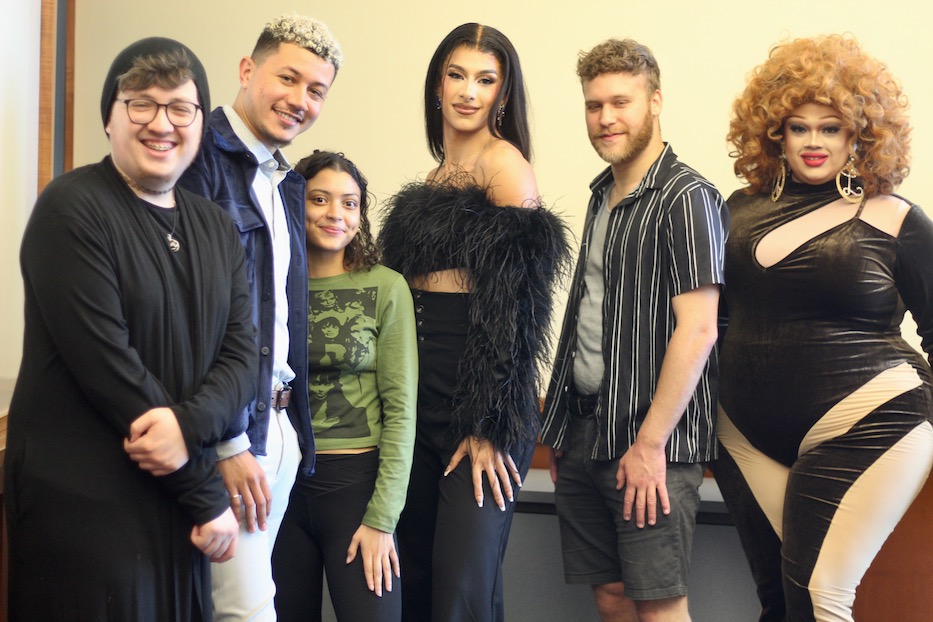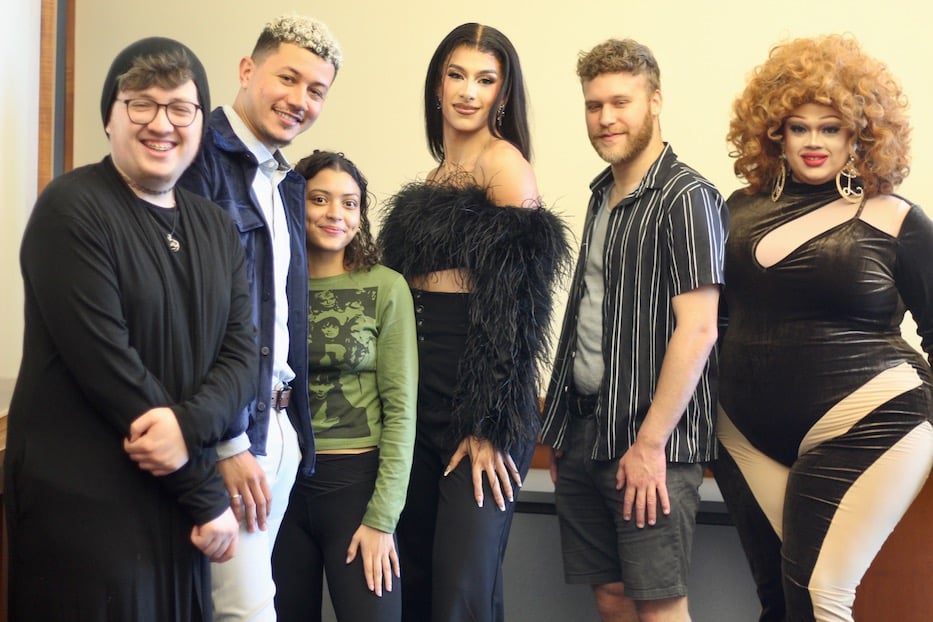
Drag | LGBTQ | Southern Connecticut State University | Arts & Culture | Education | Hispanic Heritage Month

Graduate assistants Brandon Iovene and David Perez, SCSU junior Jae'la Rivera, Sapphire Bills, senior Elijah Ortiz and Xiomarie LaBeija. Lucy Gellman Photo.
Before she ever felt comfortable coming out of the closet or stepping into drag, Sapphire Bills spent half of her life trying to be someone she wasn't. At home, she would experiment with makeup, then wash it off before anyone discovered her secret. In Bridgeport, she would push herself to act more masculine than she felt. It was a mask—and it made her miserable.
Then during the pandemic, she started thinking about what brought her joy—and it wasn't living in someone else's shadow. Now, she's a full-time makeup artist by day and a drag queen by night—who can rock it in her own skin, whatever form that may take.
That story of personal transformation—and many others—came to the Adanti Student Center at Southern Connecticut State University (SCSU) Tuesday afternoon, during "Sabor y Saber: Celebrating LGBTQ+ Latinx/Hispanic Voices." Part of SCSU's Hispanic Heritage Month programming, the panel featured drag queens Sapphire Bills and Xiomarie LaBeija, as well as SCSU students Jae'la Rivera and Elijah Ortiz.
In a discussion that ranged from Christianity to colorism to the history of ballroom, panelists spoke on their own coming out experiences, painting a portrait of self-love that remained long after remarks had ended. Close to 20 undergrads, graduate students, and staff members attended.
"Being a queer individual, doors aren't often opened for you," said Bills, a Bridgeport-raised queen who is a princess in the Connecticut chapter of the house of LaBeija. "You have to knock those doors down. I just made the decision to be in that fight and do it for myself."
"A lot of people think they love themselves, and they really don't," she later added. "And it shows in the way they carry themselves in interactions with other people, with how they treat themselves, all those different things. I've found that self-love is your number one key to being anything you want to be. It's about being happy within yourself. And it's a journey—it's not something that's gonna happen overnight—but you have to want it. You have to want better."
That sense of journeying was true for all of the panelists, so much so that it became a core message of Tuesday's event. Kicking off the panel just after noon, LaBeija recalled growing up as "a little brown individual in the good old city of Bridgeport," whose Latino family was closely affiliated with the Pentecostal church for as long as she can remember.
In that religious environment, there was no space for being gay, let alone doing drag or working to ensure safety for fellow LGBTQ+ people (LaBeija's nonbinary alter ego is APNH Safe Space Coordinator Jovanni Cabanas). For years, she struggled to reconcile who she was with the sin her relatives and faith leaders talked about when they mentioned queer people. By the time she left for college at 18, that brand of Christianity didn't sit well with her.
"It was time to start my own chapter," she said. "It took me to actually have to go through religion and get thrown out of religion to find who I was. As human beings, we have a tendency to jump on the bandwagon. As soon as someone says 'Here's the Bible, read it, you're gonna go to hell,' of course I was gonna jump on."
Until, that is, she got off. Frustrated with the church, LaBeija began doing her own research, which led her back to her family's ancestral home of Puerto Rico. In the midst of reading about Indigenous Taíno history, she learned about two-spirit culture for the first time. She also discovered that her grandfather had been a tribal leader in Canóvanas, giving her a space to reconnect to her roots.
Empowered with new knowledge, she started to challenge conventional beauty standards, which told her that fat bodies, nonwhite bodies, and darker Latinx bodies were not beautiful or worthy of care and attention. "I realized that, you know, it's up to me ... I have to spell 'fat' with a 'ph,'" she said. "It's time for me to indulge in myself, educate myself, love myself. From there, that's where Xiomarie was able to flourish."
She added that she now loves so much of her Afro-Latina identity, including a focus on family that her parents and relatives instilled in her from a young age. Growing up, it meant huge holiday gatherings and family celebrations, where there was always room at the table for one more person. Now that she's a house mother, LaBeija creates places to convene her house and chosen families, from outdoor barbecues to cozy movie nights with treats and sizzling conversation.
That message resonated for Rivera, a junior studying psychology and women and gender studies. Raised in Bridgeport to a Brazilian mom, she originally struggled with her queer identity because there wasn't a framework for it, she said. As a kid, she remembered attending church classes with fellow Brazilian girls, and receiving lessons in "how to be good for a man." When she tried to talk to family members about her identity, she felt like there was a cultural gap that was more of a chasm.
"I feel like the path to acceptance, it's gonna look very different for someone that's Latinx or Hispanic," she said. "It's gonna rain before it storms, and you gotta be comfortable with the fact that you existing is enough in itself."
Meanwhile, she was navigating a country that told her immigrants like her mom, who had uprooted her life in Brazil so that her family might thrive, were somehow less deserving than their white and U.S.-born counterparts. It meant that she had to struggle and make peace with every part of who she was.
Now, she said, she brings all of her identities into her studies, her job at SCSU's Sexuality and Gender Equality (SAGE) Center and her work off-campus at a daycare. She called her lived experience with a formerly undocumented parent, as well as learning what it was to be both queer and Latina, especially meaningful in informing who she is today.
"There's a lot of intersection between who I can represent," she said. "I might have a dad [at the daycare] who doesn't speak English, and I get them. Or I might have a family who may not understand how to fill out this form, how to pay tuition, and I can be there for them. Or I can come here [to campus], and I might see another student who may not feel represented in their queerness, and I can at least talk to them and share my experience."
Bills, who has performed across the state, echoed that sentiment as well. Like LaBeija, she grew up in a religious household in Bridgeport, told that LGBTQ+ culture "is an abomination" and that being gay was both a sin and a choice. At home and in the community, she felt the need to come off as masculine, taking it to heart every time she heard that certain behavior wasn't appropriate for young boys. Even after she came out, she said it took her three years to feel safe doing drag, because she was worried what her family might think or say.
"When I was raised, there was a lot of 'Don't move that way. Don't talk like that. Don't sing those songs.' And as a kid, I never thought those things were wrong," she said. "I was just living my life, like, 'Beyonce is that girl!' And then my parents are saying, 'Don't sing that, that's for girls.' That makes you start to think that all that you enjoy and all that you do are wrong."
Now, she tries to take that experience and remind those close to her, including siblings and family members, to be more thoughtful about how they speak to their children and to members of the next generation. She added that she didn't get there until she realized that she needed to love herself just as she was, not as the person anyone else wanted her to be.
"Listen, we're just human," she said. "I don't need you to like me. You just need to respect me and recognize that I'm a human just like you, trying to figure out this thing that we call life."
Ortiz, a senior majoring in sociology who self-identified as a white Puerto Rican, tied his own story of self-acceptance to his time at SCSU, and his work as a diversity peer educator in the school's Multicultural Center (MCC). Before he was a student at Southern, he said, he wasn't sure what he wanted to pursue in college, or even why he wanted to attend it. Meanwhile, his family accepted that he was gay, but didn't really talk about it. After he came out at 17, it left him feeling unmoored.
Then, during his time on Southern's sprawling main campus, his friends looped him into the peer educator program at the MCC. The role brought him into classrooms, support and affinity groups, and even meetings with staff and faculty that he wouldn't have otherwise had as a student. It taught him how to talk about his own identities as a gay man, a Puerto Rican, and an aspiring drag queen who made that dream come to fruition in 2022.
"I surround myself with a group of people that I know can really understand me and accept me, and that helps a lot," he said, also shouting out the New Haven Pride Center as another safe haven in the area. "Going out in public, I feel like a lot of the time, I put up a front or a mask to protect myself. But when I'm with my friends, and with a group of people that can really accept me, I feel a little more comfortable being able to accept myself."
He added that it motivates him to make positive change on campus every day, a trend that he hopes to continue as he graduates. Rivera chimed in that she agrees—and tries to celebrate the small wins in her life every day for that reason.
"What is it like being a Latinx/Latine person of a queer identity in Connecticut, and is there a way that people around you, like the people in this room who may not have those identities, can like, hold you up and lift you up?" asked Danielle Campbell, who is a graduate student at SCSU and a freelance writer for the Arts Paper.
Answering for the group, LaBeija stressed the importance of names and pronouns. For instance, she said, people don't seem to have any trouble saying Xiomara. So Xiomarie shouldn't be hard. It's why she uses a standard greeting of "Hi, my love" instead, she said—it's gentle and warm, without the hassle of pronouns.
"For all you know, there's an individual waiting for you to have that moment with them, so that they can feel seen, so that they can feel heard, so that they can feel motivated, so that they can feel like they're not alone," she said. "So that they can feel, like, 'Finally.'"

